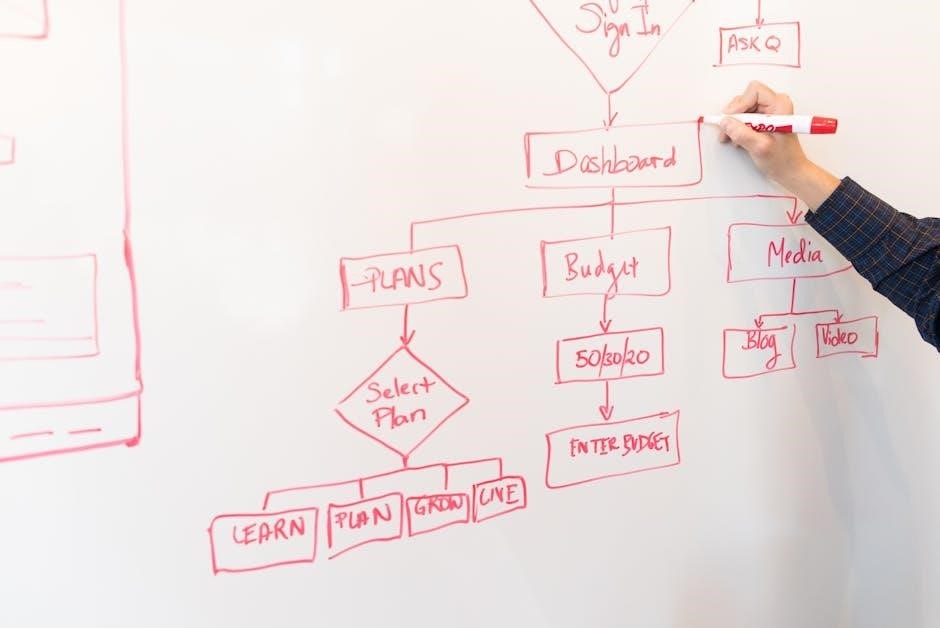The MaineCare Benefits Manual is a comprehensive guide outlining coverage‚ policies‚ and reimbursement procedures for Maine’s Medicaid program. It ensures clarity and consistency for providers and recipients‚ detailing essential services like doctor visits‚ emergencies‚ and substance use treatment‚ while addressing eligibility and application processes.
Overview of MaineCare and Its Importance
MaineCare is Maine’s Medicaid program‚ providing essential health coverage to low-income individuals‚ families‚ elderly‚ and disabled residents. It ensures access to critical services like doctor visits‚ hospital care‚ prescriptions‚ and mental health treatment. The program plays a vital role in reducing healthcare disparities and improving overall well-being. By covering necessary services‚ MaineCare supports vulnerable populations‚ helping them maintain health and independence. It also offers financial stability to healthcare providers‚ enabling them to deliver quality care; This program is fundamental to Maine’s healthcare system‚ ensuring equitable access for those in need.
Structure and Purpose of the MaineCare Benefits Manual
The MaineCare Benefits Manual is structured into sections‚ each detailing specific services and policies. It serves as a guide for healthcare providers‚ outlining reimbursement methodologies‚ eligibility criteria‚ and covered services. The manual ensures clarity and consistency in administering MaineCare‚ Maine’s Medicaid program. It is regularly updated to reflect changes in state and federal regulations‚ ensuring compliance and alignment with healthcare needs. The manual’s purpose is to provide transparent and accessible information‚ helping providers understand policies and deliver quality care to eligible individuals. It is a critical resource for navigating MaineCare’s complex framework effectively.
Section 31: Federally Qualified Health Center Services
Section 31 covers services provided by Federally Qualified Health Centers (FQHCs)‚ including primary care‚ dental‚ and mental health services. An Alternative Payment Methodology (APM) was implemented effective March 1‚ 2023.
Services Included Under Section 31
Section 31 of the MaineCare Benefits Manual outlines services provided by Federally Qualified Health Centers (FQHCs). These include primary care‚ dental services‚ mental health counseling‚ and substance use disorder treatment. FQHCs also offer preventive care‚ chronic disease management‚ and vaccinations. The manual specifies that these services are essential for maintaining community health‚ particularly for underserved populations. Effective March 1‚ 2023‚ an Alternative Payment Methodology (APM) was implemented to enhance reimbursement for FQHCs‚ ensuring sustainable and equitable funding for these critical services. This section emphasizes the importance of accessible‚ comprehensive care for MaineCare beneficiaries.
Proposed Changes and Alternative Payment Methodology (APM)
The MaineCare Benefits Manual introduces an Alternative Payment Methodology (APM) under Section 31‚ effective March 1‚ 2023. This change aims to enhance reimbursement for Federally Qualified Health Centers (FQHCs) by replacing the traditional fee-for-service model with a more predictable payment structure. The proposed changes are in accordance with Maine P.L. 2023‚ Ch. 643‚ which addresses state appropriations and operational adjustments. The APM seeks to stabilize funding for FQHCs‚ ensuring sustainable services for beneficiaries. This adjustment aligns with state law and focuses on improving healthcare access‚ particularly for underserved populations.

Section 65: Behavioral Health Services
Section 65 covers Behavioral Health Services‚ including substance use treatment and mental health services. Recent updates‚ posted on Jan 13‚ 2023‚ detail expanded coverage and policies.
Coverage and Scope of Behavioral Health Services
Section 65 of the MaineCare Benefits Manual outlines the scope of Behavioral Health Services‚ including mental health and substance use disorder treatments. These services are designed to address a wide range of needs‚ ensuring access to necessary care for eligible individuals. Coverage includes diagnostic assessments‚ therapy sessions‚ and evidence-based treatments. The manual also specifies provider qualifications and service delivery standards. Recent updates‚ as of January 13‚ 2023‚ emphasize expanded access to these services‚ aligning with state and federal guidelines. The goal is to improve health outcomes and ensure equitable access to care for MaineCare beneficiaries.
Recent Updates and Rulemaking in Behavioral Health
Recent updates to Section 65 of the MaineCare Benefits Manual focus on expanding access to Behavioral Health Services. As of January 13‚ 2023‚ rulemaking activities have prioritized improving service delivery and aligning policies with state and federal guidelines. These changes aim to enhance care for mental health and substance use disorders‚ ensuring comprehensive coverage for eligible individuals. The Department of Health and Human Services has also introduced new reimbursement methodologies to support providers. These updates reflect a commitment to addressing the growing demand for behavioral health services in Maine‚ ensuring equitable access and improved health outcomes for beneficiaries.

Section 89: MaineMOM Services and Reimbursement

Section 89 establishes MaineMOM services‚ detailing reimbursement processes for maternal and child health programs. It references the MaineCare Member Handbook for beneficiary information and program details.
Details of MaineMOM Services
MaineMOM (Maine Maternal‚ Infant‚ and Early Childhood Home Visiting) provides comprehensive services to support maternal and child health. It includes home visits‚ education‚ and resources to improve health outcomes. Eligible families receive guidance on nutrition‚ parenting‚ and child development. Services are tailored to address specific needs‚ ensuring access to preventive care. The program aims to reduce disparities and enhance overall well-being for mothers and children. Reimbursement for providers is structured to support these efforts‚ ensuring sustainability and quality of care. Detailed eligibility criteria and service descriptions are outlined in the MaineCare Member Handbook.
Reimbursement Methodology and Updates
The MaineCare Benefits Manual outlines a reimbursement methodology ensuring fair compensation for providers. Recent updates include an 8.24% COLA for certain services‚ effective July 1‚ 2023‚ and the implementation of an Alternative Payment Methodology (APM) starting March 1‚ 2023. These changes aim to align payments with the cost of care and enhance service delivery. Providers receive tailored rates based on individual costs‚ ensuring transparency and equity. The updates reflect Maine’s commitment to sustainable and high-quality healthcare for its residents.

Section 94: Early and Periodic Screening‚ Diagnosis‚ and Treatment (EPSDT) Services
Section 94 covers EPSDT services‚ focusing on preventive care‚ screenings‚ and treatments for eligible individuals. It ensures comprehensive healthcare access‚ adhering to federal guidelines and state-specific rule updates.
EPSDT Services Overview
EPSDT services focus on early detection and treatment of health issues in children and adolescents. These services include periodic screenings‚ diagnostic evaluations‚ and necessary treatments to address physical‚ mental‚ and developmental needs. The program ensures comprehensive care‚ aligning with federal guidelines to promote health and well-being. Regular check-ups‚ vision‚ hearing‚ and dental screenings are key components. Treatment services cover a wide range of interventions‚ ensuring access to essential care for eligible individuals. This section outlines the scope and requirements for providers‚ emphasizing preventive and corrective measures to support long-term health outcomes.
Treatment Services and Related Policies
Treatment services under EPSDT are designed to address identified health needs through medically necessary interventions. These services cover a broad range of treatments‚ including physical‚ mental‚ and developmental therapies. Policies emphasize that treatments must align with established medical standards and be provided by qualified professionals. The manual outlines specific guidelines for prior authorization‚ service limits‚ and documentation requirements. Providers must ensure services are tailored to individual needs and delivered in accordance with federal and state regulations. This section also clarifies reimbursement criteria and billing procedures for treatment services‚ ensuring transparency and consistency in care delivery.

Annual Cost-of-Living Adjustments (COLA)
The MaineCare Benefits Manual includes annual COLA adjustments to ensure reimbursement rates align with inflation. Effective July 1‚ 2023‚ an 8.24% COLA was applied to specific sections.
Sections Subject to COLA
The MaineCare Benefits Manual specifies that certain sections are subject to annual Cost-of-Living Adjustments (COLA). These adjustments ensure reimbursement rates align with inflation. Effective July 1‚ 2023‚ an 8.24% COLA was applied to specific sections‚ including home health services‚ psychiatric units‚ and substance use disorder treatments. This adjustment impacts providers serving vulnerable populations‚ ensuring fair compensation for essential services. The COLA applies to sections like Section 31 (Federally Qualified Health Centers) and Section 65 (Behavioral Health Services)‚ reflecting the state’s commitment to maintaining access to quality care. These updates are detailed in the MaineCare Benefits Manual to guide providers and stakeholders effectively.
Impact of COLA on Service Providers
The annual Cost-of-Living Adjustments (COLA) significantly impact MaineCare service providers by ensuring reimbursement rates reflect inflation. An 8.24% COLA‚ effective July 1‚ 2023‚ supports providers in managing rising operational costs. This adjustment applies to services like home health care‚ psychiatric units‚ and substance use disorder treatments‚ helping maintain quality care. Providers benefit from fair compensation‚ enabling them to sustain essential services for vulnerable populations. The COLA ensures financial stability‚ allowing providers to continue offering critical healthcare services without compromising quality. This adjustment is a key component of MaineCare’s commitment to supporting both providers and recipients effectively.

Notice of MaineCare Reimbursement Methodology Change
The Department has identified services where the service provider tax will be removed‚ with rates calculated based on individual provider costs‚ pursuant to Maine P.L. 2023‚ Ch. 643.
Services Affected by the Change
The reimbursement methodology change impacts various services across multiple sections of the MaineCare Benefits Manual. Services in Sections 31‚ 65‚ 89‚ and 94 are affected‚ with adjustments to provider rates. The removal of the service provider tax alters reimbursement calculations‚ particularly for Federally Qualified Health Centers‚ Behavioral Health Services‚ MaineMOM‚ and EPSDT services. These changes aim to align reimbursement with updated cost structures and regulatory requirements‚ ensuring equitable compensation for providers. The adjustments vary by service type and provider‚ reflecting individual cost differences. This change is part of broader efforts to optimize MaineCare’s financial framework and enhance service delivery efficiency.
Reasons for the Proposed Changes
The proposed changes to the MaineCare Benefits Manual are primarily driven by the need to align reimbursement methodologies with updated cost structures and regulatory requirements. These adjustments are mandated by Maine P.L. 2023‚ Ch. 643‚ which focuses on supplemental appropriations and necessary legal changes for state government operations. The changes ensure compliance with federal and state financial obligations‚ particularly for fiscal years ending in 2024 and 2025. Additionally‚ the updates aim to optimize reimbursement frameworks‚ enhance service delivery efficiency‚ and maintain equitable compensation for providers‚ ensuring sustainable healthcare coverage for eligible Maine residents.

Rulemaking Proposals and Updates
Recent rulemaking activities include updates to Sections 31‚ 65‚ and 89‚ focusing on Alternative Payment Methodologies and expanded service coverage. These changes aim to enhance care delivery and reimbursement accuracy.
Recent Rulemaking Activities
Recent rulemaking activities have focused on updating sections of the MaineCare Benefits Manual to align with state and federal requirements. Changes include revisions to Section 31‚ introducing an Alternative Payment Methodology (APM) for Federally Qualified Health Centers‚ effective March 1‚ 2023. Section 65 has also seen updates to expand coverage for Behavioral Health Services. Additionally‚ the Department of Health and Human Services has proposed a cost-of-living adjustment (COLA) of 8.24% for certain sections‚ effective July 1‚ 2023. Public notices and comment periods have been established to ensure transparency and stakeholder input in these updates.
Public Notices and Comment Periods
Public notices and comment periods are essential for transparency in MaineCare rulemaking. The Department of Health and Human Services posts notices on its website and platforms like CoverME.gov‚ ensuring stakeholders are informed about proposed changes. Recent notices include updates to Section 31 (Federally Qualified Health Centers) and Section 65 (Behavioral Health Services). Public comments are solicited to gather feedback‚ which helps shape final rulemaking. These periods typically last 30 days‚ allowing providers‚ beneficiaries‚ and advocates to contribute. This process ensures that MaineCare policies reflect the needs of the community and comply with state and federal regulations.

Application and Eligibility for MaineCare Benefits
MaineCare eligibility is based on household composition‚ income‚ and disability status. Applications are processed through CoverME.gov or the Office for Family Independence‚ ensuring access to benefits.
Eligibility Criteria and Application Process
MaineCare eligibility is determined based on household composition‚ income‚ and disability status. Applicants can submit applications through CoverME.gov or directly to the Office for Family Independence. The platform allows individuals to self-enroll or receive assistance in selecting the best coverage option. Estimated income for 2026 must be included to determine eligibility and potential savings. Applications are reviewed by the Office for Family Independence‚ which makes final determinations. This streamlined process ensures access to essential healthcare benefits for eligible Mainers‚ including doctor visits‚ emergencies‚ and substance use treatment.
Role of the Office for Family Independence
The Office for Family Independence (OFI) plays a crucial role in administering MaineCare benefits. It processes applications‚ determines eligibility‚ and ensures compliance with program requirements. OFI assists applicants through CoverME.gov‚ Maine’s enrollment platform‚ and provides support for those navigating the system; The office also handles appeals and offers resources to help recipients understand their benefits. By streamlining the application process and ensuring accurate eligibility determinations‚ OFI works to connect eligible individuals and families with essential healthcare coverage‚ fostering access to vital services like doctor visits‚ substance use treatment‚ and prescription medications.

Future Changes and Planned Updates
Future updates include COLA adjustments‚ APM implementation‚ and state plan amendments to enhance service coverage and reimbursement methodologies‚ ensuring alignment with evolving healthcare needs and regulatory requirements.
Upcoming Adjustments and Reimbursement Changes
Planned updates include an 8.24% COLA for specific sections‚ effective July 1‚ 2023‚ impacting reimbursement rates for services like Federally Qualified Health Centers and Behavioral Health. These adjustments aim to enhance provider compensation and align with rising costs. Additionally‚ the implementation of an Alternative Payment Methodology (APM) for Section 31 services starting March 1‚ 2023‚ will streamline payments‚ improving efficiency. These changes reflect MaineCare’s commitment to modernizing its reimbursement strategies and ensuring equitable access to quality care. Providers are encouraged to review updated manuals and attend informational sessions for compliance and understanding.
Planned State Plan Amendments
The Department plans to submit future Medicaid and CHIP state plan amendments‚ effective October 1‚ 2023‚ to align with federal guidelines and enhance program efficiency. These amendments will focus on updating reimbursement methodologies and expanding coverage for critical services. Rulemaking activities will ensure compliance with federal requirements and maintain program integrity. The Department will engage in public notices and comment periods to ensure transparency and stakeholder input. These changes aim to improve access to care while adhering to state and federal regulations‚ ensuring MaineCare remains a vital resource for eligible residents.



